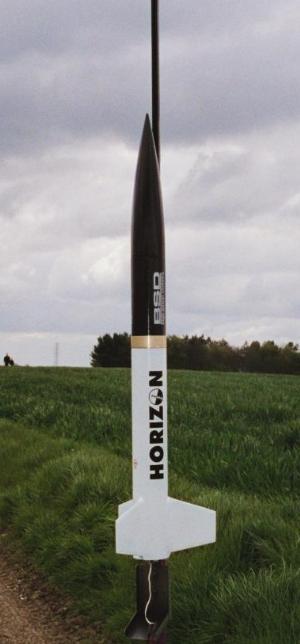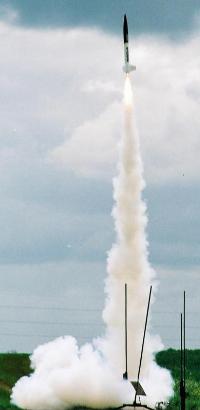BSD High Power Rocketry Horizon
BSD High Power Rocketry - Horizon {Kit}
Contributed by Gary Sinclair
| Manufacturer: | BSD High Power Rocketry  |
 Brief:
Brief:
Fully glassed airframe and fins. External fin-can assembly with Kevlar tape reinforcement of fin to motor mount. Carbon fibre reinforced payload bay coupler. Replace shock cord with tubular nylon.
Modifications:
I wanted another short 4" rocket to go with my 4" Yank Bullet and the BSD Horizon seemed to fit and offered a lot of kit for a very reasonable price. As usual with my kits I like to ensure they will survive a nasty fall or two so I tend to overbuild by using fiberglass layups and carbon fibre where necessary. I also prefer to create an external fin-can assembly and then mount it to the airframe in a single operation. This involves cutting the main body tube all the way down so the fins can just slide into place. However, preceding all of this is the necessary step of fibre glassing both the airframe and fins and using my FoodSaver to vacuum bag them.
Once cured the fins are attached to the motor mount along with the two centering rings. This assembly is then further reinforced using Kevlar tape at the point where the fin touches the motor mount. The result is a rock solid fin to motor bond. Once this has dried I slide it into the airframe (after I have slotted the airframe down to the bottom) and create external fillets using carbon fibre tape and resin.
The payload bay is constructed as per usual with the exception that for BSD kits I reinforce the inside of the coupler with carbon fibre (after I have epoxied the coupler bulkhead into the coupler). This results in a coupler which is unlikely to collapse under stress.
Construction:
The BSD Horizon kits includes:
- 1 x 24" Body tube (kraft paper)
- 1 x 10" Payload bay tube (kraft paper)
- 1 x 4"OD Plastic (ACE) nosecone (4:1 Ogive)
- 3 x 1/4"thick Plywood fins using a trapezoid shape
- 1 x coupler bulkplate assembly for payload coupler
- 1 x eyebolt, washer and nut for mounting to forward centering ring for recovery attachment
- 2 x 1/4" MDF centering rings
- Motor Retention
- 38mm to 29mm motor mount adapter
- Elastic shock cord
- Recovery bridle
- Parachute
- Decals (aplenty)
PROS: All BSD kits come with extensive documentation and for the beginner this should really help. However, since this is a kit-bash I only read the instructions once to verify that the sequence of construction followed the norm.
The kit arrived in good order with all parts accounted for. BSD kits tend to have a fin guide which is always welcome. Even as a kit-bash the Horizon was very easy to build.
I finished the rocket by first using 3 coats of UV Smooth Prime to fill in the fiberglass weave. This stuff rolls on like paint and builds up quickly over 3 applications which take a couple of hours total time with gaps of 25 minutes between layers. Sanding was done using my JCB Palm sander (what a time saver) and then finished with some wet/dry sanding paper prior to application of some grey filler primer  spray paint. After a couple of iterations of sanding and priming I was ready for the gloss coats. The Horizon only uses two colors (white and black) and these are both in separate sections (white on the motor tube and black on the payload section and nosecone) so painting was very easy. Decals came last and as always with BSD kits were easy to apply and looked great afterwards.
spray paint. After a couple of iterations of sanding and priming I was ready for the gloss coats. The Horizon only uses two colors (white and black) and these are both in separate sections (white on the motor tube and black on the payload section and nosecone) so painting was very easy. Decals came last and as always with BSD kits were easy to apply and looked great afterwards.
CONS: I don't have too many cons except perhaps for the elastic shock cord which I replaced with 1/4" tubular nylon and the Ace nosecone.
Flight:
The only flight so far was on an I161W-10 in a 15mph wind. The flight was straight and fast with ejection at apogee and a 1/4" mile walk to retrieve the rocket. No damage was sustained apart from some scratched paint. I used a Nomex bag and shock cord protector so no wadding was necessary.
Summary:
PROS: The Horizon is an easy kit to build and modify. You get a lot for your money so its good value. It is the sort of kit you can put in a massive motor and if it shreds not feel too bad about the loss. Having said that I built mine to last.
CONS: Since this was a kit-bash I can't really say. If built stock I am sure the elastic would eventually wear and break.
Other Reviews
- BSD High Power Rocketry Horizon By Gene Wolski (October 21, 2011)
BSD Horizon (4") with 38mm motor mount. I flew this rocket stock for my Level 1, and I later modified it to use dual deployment for my Level 2. Components BSD Rocketry Horizon (4" diameter) with 38mm motor mount and G-10 fins Components: Nose cone Payload section (10") Tube coupler, bulkhead plate, and hardware Booster section (24") 38mm motor tube ...
- BSD High Power Rocketry Horizon By F.W. Dick
Overview I had never built a high power kit, but after many hours searching the Internet, I felt confident in placing an order for a BSD Horizon. The company’s website was pretty adamant about the Horizon being the best way to certify Level 1. They cited simple design, strong construction and excellent instructions. I knew that since I had no high power experience I would need all of the ...
 |
 |
Flights
Sponsored Ads
 |
 |











